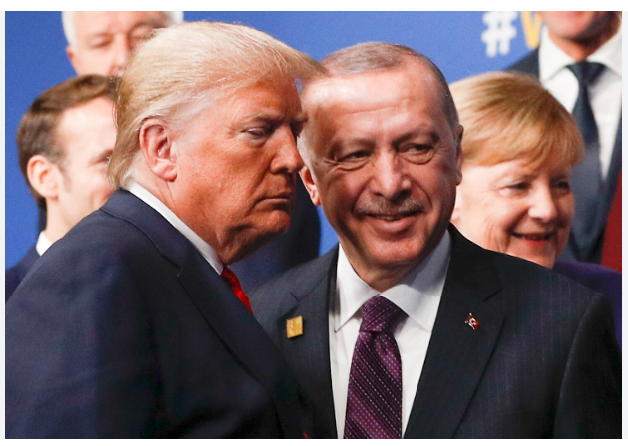Ankara has high hopes from Trump 2.0, as a large number of topics of mutual interest had been put on ice during the Biden Presidency. While Trump and Erdogan hadn’t always looked eye to eye in the former’s first term, according to Erdogan and at least one member of Trump’s transition team they are “old friends. Analysis of potential progress in key areas of policy differences run the gamut from bombastic (Berat Albayrak will be appointed to VP position, because he is a close friend of Jared Kushner—probably not true) to more somber views that the war in the Middle East could poison a budding romance.
Middle East Monitor researcher Dr Elif Selin Calık offers a more grounded and balanced view. Indeed, she concludes there is room for improvement. How? And Where?
She writes:
Henry Kissinger in his book, “Diplomacy” says that ‘When statesmen want to gain time, they offer to talk.’ Now that Donald Trump is back in the White House, the US-Turkiye relationship comes to an impasse. Related with Kissinger’s statements, the question appears: Will Trump offer to talk with Erdogan around the diplomacy table? This bilateral relationship, shaped by shared strategic priorities and a long history of partnership and competition, has been reconceptualised again.
With Turkiye on a larger geopolitical footing, such as its entry into the BRICS alliance, Trump’s administration might find new diplomatic avenues. Trade tariffs, a reassessment of military positions in northern Syria, as well as continued debates about NATO and other alliances, make the new Trump age one of both promise and threat.
Lower tariffs: An economic reinvention?
In his first term, President Trump imposed tariffs on Turkish steel and aluminium, further heightening trade frictions, and leading to Turkiye’s exports to the United States decreasing by nearly 20% in 2018-19.
Yet, recent comments by the Turkish President, Recep Tayyip Erdogan, show that Ankara hopes the new US administration will ease economic tensions. To drop Turkish tariffs would be an early nudge toward Trump’s foreign policy and could revitalise a trade relationship worth close to $25 billion a year.
According to the Turkish Statistical Institute, the US is Turkiye’s second-largest export market, after Germany. Lower tariffs would benefit key Turkish industries like textiles, machinery and auto components, and would possibly increase Turkish exports to the US by 10% a year.
To Trump, lowering tariffs could be a step back toward an “America First” approach focused on creating win-win agreements that help drive growth while soothing tensions with a NATO ally.
American soldiers in Northern Syria: a transitional phase?
Turkiye’s lingering anxiety over US backing of Kurdish militias in northern Syria has made US-Turkiye relations volatile, and Ankara regards the Kurdish People’s Protection Units (YPG) as a PKK-style terrorist group.
In 2019, Trump announced an interim troop withdrawal from the area, enabling Turkiye to set up a “safe zone” in northern Syria. And, now, with Trump back home, there will be another troop withdrawal in play, one that may serve Turkiye’s security interests and boost bilateral ties. With some 900 US troops in northern Syria, stability there and particularly against Daesh are critical to its future. Yet, a further withdrawal would reduce US influence and give Turkiye more control over the border.
This would lessen US-Turkiye tension on one front, but it would change the dynamics of the Middle East, changing US alliance with Kurds, and potentially increasing Turkish regional influence.
NATO allegiances: Recalling vows amid new friendships
Turkiye’s NATO allegiance remains a key component of its defence architecture and an indispensable connecting link to the West.
Yet, Turkiye’s acquisition of the Russian S-400 missile defence system has complicated its relationship with the alliance, with the United States imposing sanctions and pulling it out of the F-35 fighter jet programme. Trump’s previous approach to the problem left no stone unturned, and his new term promises an opportunity to more diplomatically tackle Turkiye’s defence requirements, including, perhaps, allowing Turkiye back into the F-35 program under certain circumstances.
Relatedly, a better defence pact could strengthen NATO’s southern edge and confront shared security risks, particularly as Turkiye dominates the region. Although the S-400 is still an obstacle, changing US policy would also increase Turkiye’s participation in NATO and bring strategic benefits to both sides.
The road to be – Poised for new partnership
President Trump’s previous relationship with Erdogan suggests that there is room for intense personal diplomacy. The two leaders have one thing in common: a pragmatic stance that could bring new cooperation – particularly on trade and in military matters. A reconfigured US-Turkiye partnership could also serve as an example for other NATO members seeking a geopolitical role outside the West, where Western alliances would be supplemented by new alliances in Asia, Africa and Latin America.
Challenges remain, of course. Also, Trump’s “America First” strategy may have come at the expense of Turkiye’s desire for greater foreign policy autonomy and diversification. The bottom line is that Trump’s new administration opens up a door for reimagined US-Turkiye relations in which trade, security and diplomacy are of equal interest. In the face of geopolitical uncertainties, Turkiye finds itself torn between strengthening Western ties and moving towards a more multipolar foreign policy.
For the United States, an economic and defence partnership with Turkiye could help maintain an alliance that is essential to stability in the Middle East, Europe and beyond. Whether these reforms will unite the two states or separate them depends on how willing each government is to listen to one another’s most pressing questions and adopt a thoughtful, mutually respectful strategy.
Excerpt
Follow our English language YouTube videos @ REAL TURKEY: https://www.youtube.com/channel/UCKpFJB4GFiNkhmpVZQ_d9Rg
And content at Twitter: @AtillaEng
Facebook: Real Turkey Channel: https://www.facebook.com/realturkeychannel/
